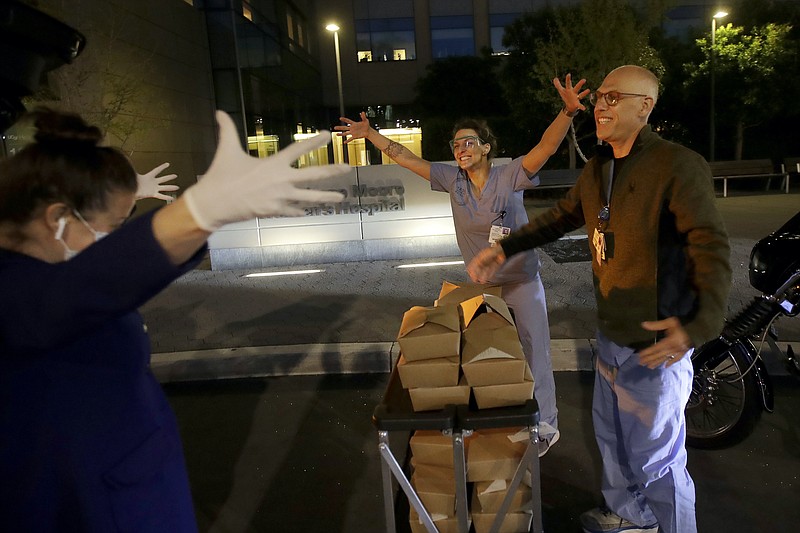If you can be anything, be kind.
We've all seen or heard that simple sentence: It's a meme, it's a shirt, it's everywhere. But too often it's absent from our hearts and our actions. We hear it, maybe smile, file it away, move on down the road and glower at the guy moving slowly in the crosswalk and coughing with no mask on.
But what if he has no mask and wants one? What if his legs are too weak to carry him all the way to the health department? We've got an extra, unused one in the glove box. Should we offer it to him?
You bet. And here's the kicker. He won't be the only beneficiary. Science says being kind pays off.
"Research shows that acts of kindness make us feel better and healthier. Kindness is also key to how we have evolved and survived as a species, scientists say," according to the recent reporting of Seth Borenstein of The Associated Press. "We are hard-wired to be kind."
Of course, we're also hard-wired to be jealous and aggressive with each other. After all, we read about murder in just the fourth chapter of Genesis. But there's good news there, too. In December, Science Focus cited the work of several researchers to posit that humans may have evolved aggression - if for no other reason than a communal defense response - "but that doesn't mean we were hard-wired for war."
So there's hope, And to keep it that way in today's chaos (pick just any three things and add the COVID-19 pandemic), let's highlight the newer research on kindness.
"Kindness 'is as bred in our bones as our anger or our lust or our grief or as our desire for revenge,' University of California San Diego psychologist Michael McCullough, author of the forthcoming book "Kindness of Strangers," told The AP. "It's also, he said, "the main feature we take for granted."
When psychologists lumped values into 10 categories and asked people what was more important, benevolence or kindness, kindness came out on top. It beat hedonism, having an exciting life, creativity, ambition, tradition, security, obedience, seeking social justice and seeking power, said University of London psychologist Anat Bardi, who studies value systems.
Kindness and cooperation work for many species, whether it's bacteria, flowers or our fellow primate bonobos, according to Duke University evolutionary anthropologist Brian Hare.
Hare studies bonobos and compares the peaceable and decidedly kind and small monkeys historically known as pygmy chimpanzees to larger aggressive chimpanzees that attack outsiders.
Bonobos don't kill but help out strangers as well as each other. Their reward? The more friends you have, the more individuals you help, the more successful you are. Male bonobos are far more successful at mating than their male chimp counterparts, says Hare, author of the new book "Survival of the Friendliest."
McCullough says the human ability to reason "is the secret ingredient, which is why we donate blood when there are disasters" and why most industrialized nations spend at least 20% of their money on social programs, such as housing and education.
But both kindness and aggressiveness, like other traits, can be activated or dampened by emotional activity and outside stimuli. Duke's Hare used a mother bear as an example. She is loving and generous to her cubs, but aggressive and dangerous when an outsider comes near.
Sound familiar? Like the polarization of the world? When we are feeling isolated or threatened by virus, unemployment, climate change, statue change, a protester, a mask, even an unmasked cougher, we become more likely to morally exclude those "others" and dehumanize them. The cruelty begins.
Still more research, however, shows that our bodies reward us when we choose kindness.
University of California Riverside psychology professor Sonja Lyubomirsky has tested the concept in numerous experiments over 20 years, finding again and again that people feel better when they are kind to others.
"Acts of kindness are very powerful," she told The AP. The people who were kind to others became happier and felt more connected to the world.
And it's not just emotional. It's physical. In people doing more acts of kindness, the genes that trigger inflammation were turned down. And in new ongoing studies, she's finding more antiviral genes in people who perform acts of kindness.
So, yeah, stop and offer that slow guy in the crosswalk your extra mask.
And give a cheer for science while you're at it. Again and again science not only finds and seeks new treatments for our ills and foibles, but also proves age-old wisdom.
After all, it was the Ancient Greek fabulist and storyteller Aesop who, sometime around 600 B.C., taught:
"No act of kindness - however small - is ever wasted."
